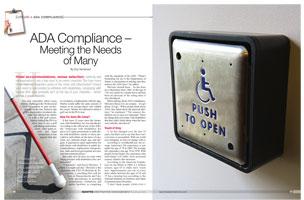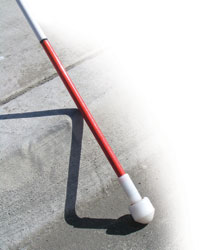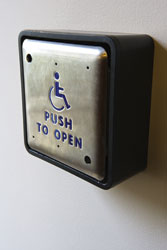
 Hotel accommodations, venue selection, catering and transportation - not a bad start to an event checklist. But how many times have we forgotten some of the most vital information? Unless your event is surrounded by athletes with disabilities, complying with federal ADA laws probably isn't at the top of your checklist - which can be a grave mistake.
Hotel accommodations, venue selection, catering and transportation - not a bad start to an event checklist. But how many times have we forgotten some of the most vital information? Unless your event is surrounded by athletes with disabilities, complying with federal ADA laws probably isn't at the top of your checklist - which can be a grave mistake.
You may remember when Casey Martin challenged the Professional Golf Association to play professionally on the tour. However due to a degenerative circulatory disorder that affected his ability to walk a full golf course, Martin lobbied the PGA to allow him to use a golf cart during each tournament. After some review and legal interjection, it was argued that due to circulatory complications with his legs, Martin would suffer the same amount of fatigue as an average player who walked the course. Martin was allowed to utilize a golf cart in the PGA tour.
How Far Have we Come?
It has been 19 years since the Americans with Disabilities Act was introduced. According to the official site of the ADA, the 'Americans with Disabilities Act gives civil rights protections to individuals with disabilities similar to those provided to individuals on the basis of race, color, sex, national origin, age, and religion. It guarantees equal opportunity for individuals with disabilities in public accommodations, employment, transportation, State and local government services, and telecommunications.'
But really, how far have we come when taking persons with disabilities into consideration?
"Ultimately," said Kevin McGuire, "I think it is night and day." McGuire is the chairman and CEO of McGuire & Associates, a consulting firm with offices in Massachusetts and New York specializing in assisting corporations, institutions and sports facilities in complying with the standards of the ADA. "What's frustrating for me is the Department of Justice is inconsistent in making sure they enforce the ADA laws," he added.
McGuire should know - he has been in a wheelchair since 1968. At the age of 7 he was struck by a drunk driver and has been an advocate of the ruling since it was introduced.
When talking about ADA compliance, McGuire likens it to an octopus - it's got plenty of legs. "When people think about ADA, they think about the physical abilities," he explained. "The sensory disabilities are as (just as) important. There are things that exist today with disabilities that they didn't think about when the laws were initially introduced."
Touch of Gray A lot has changed over the last 19 years, but that's not to say that there isn't a lot more to accomplish. With our world ever changing, we have to change with it.
A lot has changed over the last 19 years, but that's not to say that there isn't a lot more to accomplish. With our world ever changing, we have to change with it.
According to worldhealth.net, the average American's life expectancy is just under the age of 78 in 2009. The average life expectancy was age 70 in 1970. With people living longer, the expectancy that individuals will suffer from increased sensory failures also increases.
According to the American Foundation for the Blind in 2008, 6.2 million seniors, ages 65or older, have vision loss. Approximately one out of every three adults between the ages of 65 and 75 has a hearing loss according to the National Institute on Deafness and Other Communication Disorders.
"I don't think people 'get' the graying of America," said McGuire. "Our parents are getting older. Over 90 percent of deaf Americans cannot sign. It's the same with the blind, they can't read Braille. They are losing their hearing or their sight because they are getting older."
That poses a problem not only for sports event planners but for the venues as well. Not only do we need to consider the athlete that may have special needs, but we need to take into account the parent, grandparents, neighbors and friends.
"Anything that is audibly announced in a bowl should be captioned for deaf fans," added McGuire. "It has had major ramifications for every sports venue. Each sport is different and it's quite problematic."
Not only are more Americans considered disabled due to living longer, but the war in Iraq has created more disabled Americans as well. There are 1.2 million members of the Disabled American Veterans organization and more than 21,000 servicemen and servicewomen have been injured in Iraq and Afghanistan according to the website disabledusveterans.com.
"There is so much more medical technology available today," said McGuire. "That allows for higher survival rates, but it also increases the number of disabled."
That's a lot to think about, but wait there's more.
Mr. Peanut - The Enemy?
Considerations such as dietary accommodations are a hot topic right now, especially around sports. With an influx of allergies becoming more common among children, event planners need to ensure they don't run into complications.
 Up to 2 million Americans are estimated to have food allergies - peanut allergies are among the most common in the United States according to the American Academy of Allergy, Asthma & Immunology. More than 15,000 emergency room visits can be attributed to peanut allergies and approximately 100 people will die annually in the United States from an adverse reaction to peanuts according to the Food Allergy and Anaphylaxis Network.
Up to 2 million Americans are estimated to have food allergies - peanut allergies are among the most common in the United States according to the American Academy of Allergy, Asthma & Immunology. More than 15,000 emergency room visits can be attributed to peanut allergies and approximately 100 people will die annually in the United States from an adverse reaction to peanuts according to the Food Allergy and Anaphylaxis Network.
"There is a big demand for a peanut-free zone," commented McGuire. "You have to worry about allergies with younger children."
Peanuts, popcorn and cracker jacks are as common among America's favorite pastime as the game itself, but now it seems as though that might be compromised. Not if several teams in Major League Baseball have anything to do with it. The Boston Red Sox, Seattle Mariners, St. Louis Cardinals, Toronto Blue Jays and Minnesota Twins have all designated peanut-free zones for select games this season.
The 2009 season marks the second that the Red Sox will be participating in a peanut-free program. "We have taken certain steps to ensure that fans are not left out," said Marty Ray, Public Affairs manager with the Red Sox. "We put a lot of emphasis on the communication that we receive from our fans. In this case, we were very moved by some of the things that were affecting fans here."
Stephanie Maneikis, coordinator of Fan Services and Entertainment, is a key player in the success of the peanut-friendly plan. "There are two components to our peanut-free initiative," explains Maneikis. "We offer peanut-friendly designated days, where certain parts of the Coca Cola section are reserved. We are working with (the staff at) the Asthma & Allergy Foundation of America to help people with allergies and families with kids that want to come out to the park and enjoy the game."
Creating a peanut-free zone isn't as simple as declining to sell peanuts on game day. "We ensure that the area is clean and free of any excess peanut shells," said Maneikis. "We have extra staff to ensure that no one walks through with peanuts, our concession areas do not sell them on those days (in that section) and we provide extra medical staff in case there is an incident."
The Red Sox also provide a private glass enclosed booth located on the press level for at least one game during every home stand. "It's for families with severe peanut allergies that are unable to even sit in the Coca Cola section. We build as much of a protective environment as possible," said Maneikis.
The Mariners, Cardinals, Blue Jays and Twins are all running similar programs.
Back to the Basics
All of this is more than relevant, but that's not to say that event planners should ignore the basic guidelines during the planning process. The essentials still apply: Ensure that entrances are wheelchair accessible, that there is access to ADA seating, restrooms are in compliance, and sight lines for wheelchair-bound fans are over spectators when the crowd is standing to catch the action.
"It's the little things that can break you," said McGuire. "It's those small things that get people frustrated."
The same rings true for the athletes, coaches and referees. Locker rooms and staff offices should be wheelchair accessible, as well as showers and restrooms.
Some basic advice from McGuire when choosing your destination or venue:
"Number one: Never believe any organization that puts a wheelchair symbol out - do your research in person.
Number two: Contact a city or town commissioner for disabilities within the mayor's office or an independent living center. Ask for information about their city, venues and hotel accommodations. They deal with the consumers every day.
Number three: Look closely at contracts and ensure there is ADA language. Research who is held liable for any ADA violations, the tenant (event planner) or the landlord (venue)."
Resources and Technology
It's true, we have come a long way in 19 years, but there is still a long way to go. With the changes not only in the way we live and how long we live, but also the technology that is being developed each year to accommodate individuals with disabilities.
 The New England Patriots are in the forefront. The Hall at Patriot Place by Raytheon is an example of the cutting edge technology that is being developed for sports fans with disabilities.
The New England Patriots are in the forefront. The Hall at Patriot Place by Raytheon is an example of the cutting edge technology that is being developed for sports fans with disabilities.
The Hall opened in September 2008 and not only features exhibits constructed for wheelchair access, it also provides two wheelchair lifts and many touch screen interactive kiosks. But maybe the most impressive feature is the state-of-the-art hand-held Durateq captioning and listening device for guests with hearing or visual impairments. This technology provides environment descriptions and closed captioning.
Daktronics has been a leader within the sports industry and known as one of the world's leading designers and manufacturers of LED video for sports venues. They are working with 26 National Football League venues, 26 Major League Baseball arenas, 19 National Basketball Association arenas and 20 National Hockey League facilities as well as more than 100 minor league ballparks and over 1,000 college athletic facilities.
As this technology continues to develop, so do the online resources. There are several websites that will help answer any question about meeting the needs of persons with disabilities attending your event. Here's a few:
ada.gov - American with Disabilities
aafa.org - Asthma & Allergy Foundation of America
afb.org - American Foundation for the Blind
nidcd.nih.gov - National Institute on Deafness and other Communication Disorders
aaaai.org - American Academy of Asthma, Allergy & Immunology
foodallergy.org - Food Allergy and Anaphylaxis Network.
As a sports event planner, your checklist may seem endless, but the bright side is that you're ensuring that you're meeting the needs of the athletes, staff, family and friends with disabilities. Your event is sure to be a success.

